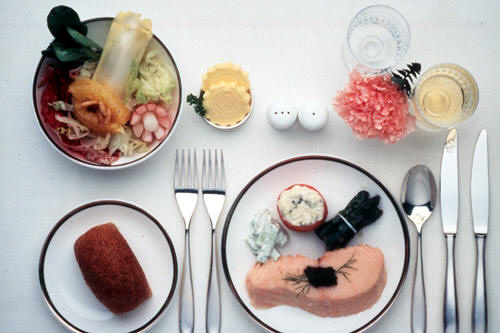Food of the future to be developed on the base of molecular biology and genetics
NASA makes sandwiches, which stay edible for several years
In addition, NASA studies food products, which will be able to satisfy personal needs of a particular consumer taking into account his/her allergies and other peculiarities of human organism. It is scientific alchemy rather than ordinary culinary techniques. Laboratory engineering rather than traditional industrial processes. Food that will be in the supermarkets and restaurants in the future will not have visual differences from that of today. However, it will be manufactured, processed and cooked in a different way. The future is near: “functional foods” – foods and drinks with added vitamins, minerals and fatty acids omega-3 – will look tastier (just for reference: the manufacturing of these products accounted for 800 million euros in Europe in 2004). However, the main surprises – products developed in molecular studies, genetic discoveries and space research - are still to come.
Molecular gastronomy has a flavor of the future in its name. In other words, molecular gastronomy is the analysis of physicochemical laws while cooking and the use of recent discoveries for creating unusual recipes. This is a new tendency, which appears in Europe mostly and has restaurant chefs, matter physicists and experts on chemistry among its participants. The starting point was the notion that there is a surprising molecular linkage between different products (for example, chocolate and caviar, asparagus and liquorice). Its discovery can lead to invention of unexpected mixes.
Englishman Heston Blumenthal is considered to be the founder of molecular cuisine: he is the first youngest chef who has already 3 Michelin stars in his 39. In Italy the most famous representative of the new trend is Davide Cassi, specialist in matter physics at the University of Parma. “Except for some recipes all the technologies which are used in scientific gastronomy (such as liquid nitrogen freezing) will be applied at home kitchens. As a result, menu will be enriched thanks to “molecular dishes”, Cassi says.
New technologies left their mark on another sphere, which will play the main role in the future. That is flavors and odors, synthesized in laboratories. Especially when it comes to the laboratory of perfume elaboration of Swiss perfume giant Givaudan. Contributing to the elaboration of more than 20 thousand artificial odors (300 for strawberry only), biologists from the multinational company organized an expedition to Madagascar forests in search of molecule, from which new aromas could be extracted.
Scientists claim that these fragrances are identical to natural ones on the molecular level. The only difference is that they will be the results of chemical processes.
In this sphere the impulse comes from NASA.L'Advance food technology of American space agency specializes in preparing foods for space missions. Such technologies as microwave ovens were developed thanks to its research. The immediate task is to make products stay fresh for longer period. “Products, which can be kept for months or even ages without losing their nourishing properties and vitamin quality,” Michele Perchonok from NASA claims. Techniques that are used include high-pressure treatment, pulsing electric fields, and high frequency sterilization. A sandwich prepared in this way turned out to be edible in seven years. The results can prove useful during the mission to Mars (although it seems that nobody dares to taste this sandwich yet).
The elaboration of artificial meat from animals' muscle cells grown in test tubes is under way in the University of Maryland laboratories. “The substitutes of meat for vegetarians already exist. They are developed from special mushrooms processed in the way that their tissue is not different from that of meat,” the author of the book “The Future of Food” Brian Ford recalls. “We will witness nothing new in this sphere in the next few years.”
Food science may soon be united with molecular biology and genetics. At least that is the goal of nutrigenomics, which tries to study connection between genes and particular food products for creating personal diets depending on genetic profile of a person. “People show different reaction to food depending on their DNA”, says biochemist and biologist from the University of Davis, California, Jim Kaput. “At the moment we are studying the effects produced by olive oil in people who consume it versus those who do not. Taking all the population into account, we will be able to prescribe more effective diets in the future. It used to be a mere fantasy and in 10-15 years it can become a reality.”
Food of the future, whatever it might be, will be kept in special packages that will provide for the safety of the product, determine when it gets out of order and inform the consumer about this. The crucial point in this case will be nanotechnologies, or the possibility of matter control on atomic and molecular levels for creating new materials.
It is not accidental that such multinational corporations as Kraft in collaboration with 15 universities of the world opened a nanotechnological laboratory a few years ago. The first goal was to tighten control over overall production chain. More pretentious goals are set for the future: manipulating the matter on molecular level can help in creating the products that will identify consumers' needs, his/her allergies, lack of any substances and will be able to supply those substances in amount needed – all this with the help of nanosensors. The future looks promising…or black. It all depends.
Subscribe to Pravda.Ru Telegram channel, Facebook, RSS!





